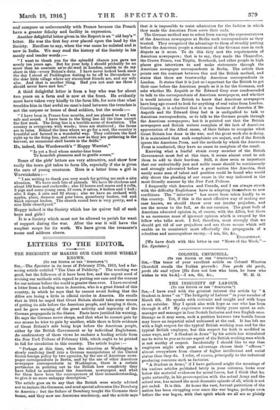LETTERS TO THE EDITOR.
THE NECESSITY OF MAKING OUR CASE MORE WIDELY KNOWN.
[To THE EDITOR OP THE “EiPzereroa.”1
Siu,—The Spectator in its issue of February 27th, 1915, had a far- seeing article entitled " The Uses of Publicity." The teaching was good, but the followers of it have been few, and the urgent need of revising our methods with regard to putting our case and the reasons for our actions before the world is greater than ever. I have received a letter from a leading man in America, who is a great friend of this country, in which he says that ho cannot avoid feeling that the Allies are losing a little in official circles in America. He recalls that in 1914 he urged that Great Britain should take some means of getting its side before the American people, and keeping it there, and he gave warning of the great activity and ingenuity of the German propaganda in the States. Facts have justified his warning. He says the German never sleeps, and that what he cannot gain by one means he tries to gain by another, while there is little evidence of Great Britain's side being kept before the American people, either by the British Government or by individual Englishmen. As confirmatory of these views he encloses a leading article from the New York Tribune of February 15th, which ought to bo printed in full for circulation in this country. The article begins :- " Perhaps at this time, when the situation at Washington is slowly resolving itself into a German manipulation of the United States foreign policy by two agencies, by the use of American news- paper correspondents in Berlin, and by the use of other American newspaper correspondents in Washington, there is a certain pertinence in pointing out to the British how completely they have failed to understand the American newspapers and what for them have been the consequences of their misunderstanding, to give it no more unhappy description."
The article goes on to say that the British were wisely advised not to imitate tho Germans, and send special advocates like Dernburg to America ; but the failure of Dernburg taught the Germans their lesson, and they now use American machinery, and the article says that it is impossible to resist admiration for the fashion in which they made the American Press servo their ends.
The German method was to select from among the representatives of the American newspapers at Berlin such correspondents as they trusted. They recognized the advantage to them of steadily putting before the American people a statement of the German case in each dispute as it arose. To do this they met the requirements of American newspapers ; that is to say, they made the Chancellor, the Crown Prince, von Tirpitz, Bomhardi, and other people in high places give interviews to and make statements through the American newspaper correspondents in Berlin. The article then points out the contrast between this and the British method, and states that there are trustworthy American correspondents in London. It states that it is just as important for the British to get their case before the American people as it is for the Germans, and asks whether Mr. Asquith or Sir Edward Grey ever condescended to talk to the correspondents of American newspapers, and whether it would interest the British to know that American newspapers have long ago ceased to look for anything of real value from London. Continuing, it is admitted that it is no business of America if Mr.
Asquith and Sir Edward Grey feel it is undignified to talk to American correspondents, or to talk to the German people through the American newspapers ; but it is pointed out that the British newspapers and British writers complain of the lack of American appreciation of the Allied cause, of their failure to recognize what Groat Britain has done in the war, and the great work she is doing.
It is maintained that such complaints are unjust, and if the British ignore the American Press, and the methods by which the American Press is conducted, they have no oauso to complain of the result.
Knowing what a fearful strain every member of the British Government must feel at this time, it seems almost cruel to ask them to add to their burdens. Still, it does seem so important that our undoubtedly just and noble cause should be continuously and strongly advocated before a great nation like America, that surely some man of talent and position could be found who would ably direct the pleading of our cause in the way indicated in the most friendly manner by the New York Tribune.
I frequently visit America and Canada, and I am always struck with the difficulty Englishmen have in adapting themselves to new conditions. The " interview " has never been taken kindly to in this country. Yet, if this is the most effective way of making our ease known, we should throw over our insular prejudice, and use the means to the full, as do our enemies. The great bulk of American educated opinion is, of course, with the Allies, but there is an enormous mass of ignorant opinion which is swayed by the fellow who talks most. I feel, therefore, moat strongly that we should get rid of our prejudices and use those means which will enable us to counteract most effectually the propaganda of a relentless and unscrupulous enemy.—I am, Sir, he.,
ENGLISHMAN.
[We have dealt with this letter in our "News of the Week."- • ED. Spectator.]


































 Previous page
Previous page